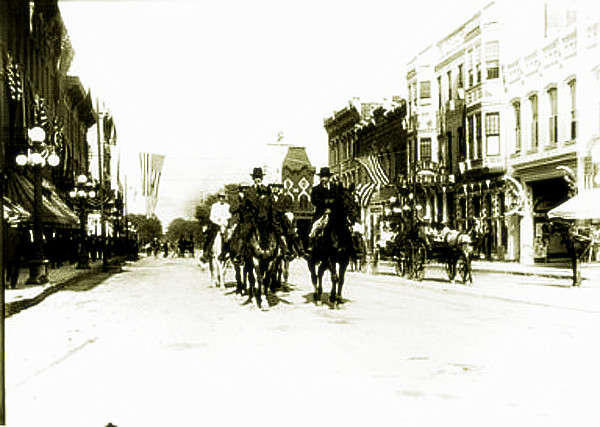
Col. Roosevelt and Governor B. B. Brooks riding west on
16th Street passing in front of the Atlas Theatre, 1910. Behind the Governor and Col.
Roosevelt is the small clock tower of the Burlington Station, formerly the Warren Emporium.
The center of the Historic District of Cheyenne is ofern regarded as 16th Street, now known as
"Lincoln Way." The largest accumulation of historic structures in a small area is along a three block stretch of Lincoln Way between the Plains Hotel and
the Dineen Garage discussed and depicted on the next page. Many of the building on the portion of
16th Stree between Capitol and Carey serve as reminder the period in the late 1880's when Cheyenne became the
"Magic City" of the Plains. In this one block stretch on the north side are the Hynds Bulding,
The First National Bank building, the Commercial Block and the Idelman Building, On the south side is
the old Phoenix Block (the Wrangler Building, formerly the Normandie Hotel), the Atlas Theatre, and
on the southwest corner of Carey and 16th the Tivoli Building. Most have only borne modest external renovations since Wyoming's
Territorial Period, although the Hynd's building is newer and the Phoenix Block now bears a coat of
paint that would make a Shutler Wagon blush.
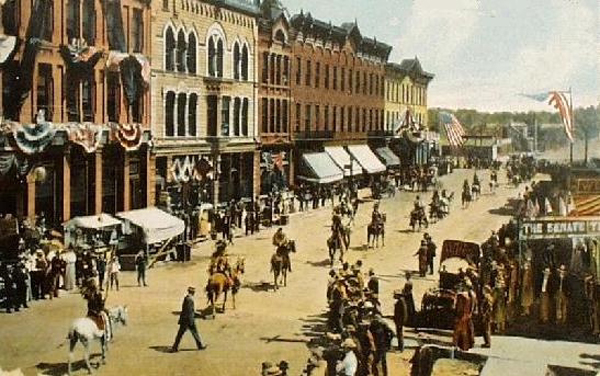
Indians, Frontier Day, 16th Street, looking east from the Tivoli Building approx. 1907. Photo of
discussed and depicted on the next page..
The use of the singular in the caption is not in
error. The term "Frontier Days" with an "s" was not officially adopted until 1915.
The first building across the street from the viewer is the Idelman Building at the corner of Ferguson (now Carey) and 16th Streets, still in existenc.
It, was constructed in
1884 and housed the Idelman Bros. Co., importers and jobbers of liquors and cigars. The company was owned by
Max and Abraham Idelman and later by Max's son Samuel Idelman. Max Idelman (1843-1913) came to Cheyenne from Evanston where he also operated a wholesale
liquor business.
The second building with the bow window on the second floor is the Commercial Block constructed
by F. E. Warren in 1883. The bow window marks the site of the office
in which Tom Horn confessed the murder of Willie Nickell. The third building is the
First National Bank Buiding constructed in 1882. Then is the Wyoming Hotel Bulding, followed at the end of the Street by the
Inter-Ocean Hotel. At the extreme right of the photo is another famous "watering hole" of Cheyenne, the
Senate Bar, owned by "Shorty" Evans. Evans advertised his establishment as "The only
second-class saloon in the city." He additionally claimed he sold "The beer that made
Milwaukee jealous." H. P. Hynds, who later built a bank building on the site of the
Inter-Ocean, also owned a saloon which was occasionally frequented by Tom Horn.
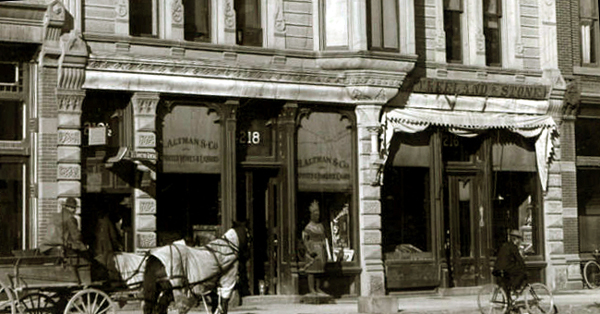
Altman's wholesale and retail liquor store on first floor of the Commercial Block with the wooden Indian in fromt, approx.
1890.
Henry Altman (1841-1931) arrived in Cheyenne about six months before the railroad as a pack peddler and
ultimately became one of the territory's important cattleman and was a founding member of
the Wyoming Stockgrower's Association. He participated in Theodore Roosevelt's ride from
Laramie to Cheyenne.
Also located in the building for the first several years was J.S. Collins' Saddle Shop. Collins and his brother
provided saddles to Buffalo Bill's Wild West. The shop in Cheyenne closed in 1885.
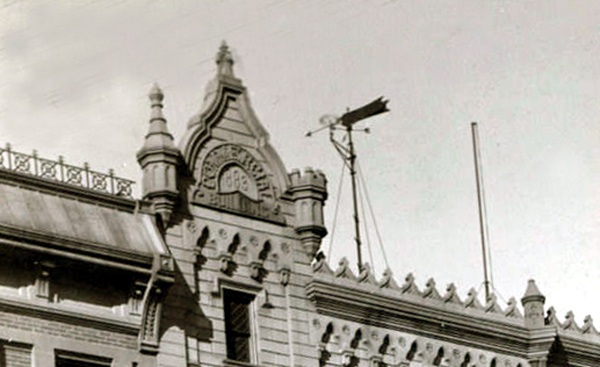
Roof of the Commercial Block showing anemeter and wind vane for the
Weather bureau.
The Weather Bureau moved in 1903 to the Citizen's Bank Building.
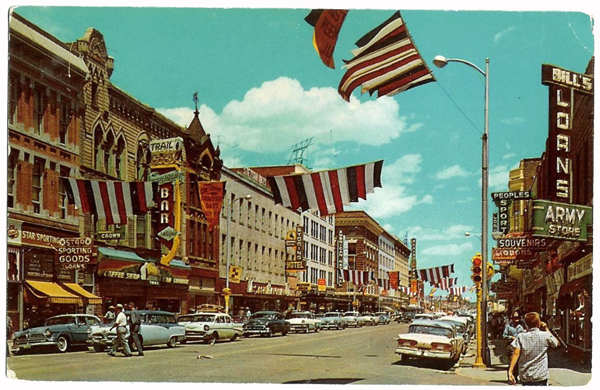
South side Sixteenth Street (Lincoln Way) between Carey and Capitol, approx. 1958. The Interocean Hotel has been replaced by the
Hynds Building after the Interocean burned.
The third building in each of the above photos is
First National Bank Building constructed in 1882 and which housed the First National Bank. The bank previously had been located on the southwest corner
of Capitol and 16th where the Wrangler Building is now location. F. E. Warren's office was also located in the building for a period of time.
The bank moved in 1907 to the Majestic Building on the northeast corner of 16th Street and Capitol. It continued in
business until July 9, 1924, when after doing business normally the day before, it failed
to open its doors. For circumstances of the bank's closing, see Altman v. McClintock, 20 F. 2d 226 (D. Wyo. 1927).
The fourth buildling was the Warren Block housing the Wyoming Hotel and beyond it at the end of the street is the Inter-Ocean
Hotel. Over the years the Wyoming Hotel Building was modified by removal of the heavy cornice and
modernizing the front. Compare the topmost photo with the 1958 view above. At the extreme right of the photo is another famous "watering hole" of Cheyenne, the
Senate Bar, owned by "Shorty" Evans. Evans advertised his establishment as "The only
second-class saloon in the city." He additionally claimed he sold "The beer that made
Milwaukee jealous." H. P. Hynds, who later built a bank building on the site of the
Inter-Ocean, also owned a saloon which was occasionally frequented by Tom Horn. Hynds made sure that his
new building was fireproof.
On Monday, December 27, 2004, at 10:36 p.m., a fire was reported in the Mary's Bake Shoppe located at 206 West Lincoln
Way (16th Street) in the area where the Wyoming Hotel in the above photo was located. Adjacent to the Bake Shoppe was
the Wyoming Home Furniture Store. The fire spread from the Bake Shoppe into the adjacent buildings. Fire fighters from the Cheyenne
Fire Department, Laramie County, the City of Laramie, the Wyoming Air National Guard, the
Frontier Oil Refinery, and the Pourdre Valley Fire Authority all responded to the
fire which took 18 hours to combat.
Following the fire, the buildings in which the Bake Shoppe and the Wyoming Home were formerly located were determined by the City Building Department
to be dangerous and the City ordered the structures to be razed. Payment of the insurance on the Bake Shoppe was
withheld for some eleven months. Thus, the City itself removed the Bake Shoppe ruins and debris at a cost of
$104,817.14. The Hynds Building, being fireproof, suffered little damage.
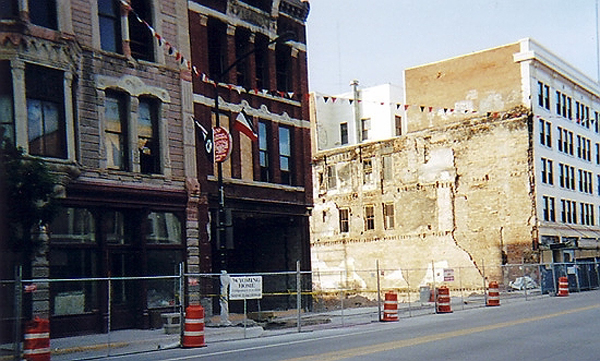
Ruins of Buildings on 16th Steet, June 2005. Photo by
Geoff Dobson
The office where Horn made his incriminating statements to Joe Lefors was
located where the bow window is in the building to the left. The Hynds Building is to the right of the
now vacant lot where the Wyoming Home Store and the Bake Shoppe once stood.
On March 4, 2005, the Wyoming Tribune Eagle reported that an accelerant "heavier than paint thinner or turpentine" had been found
in conjunction with the fire. In Febuary 2006, a former employee of Wyoming Home and occasional customer of the Bake Shoppe was taken
into custody by the Laramie County Sheriff's Office relating to some suspicious grass fires. In
questioning by the Cheyenne Police Department, the suspect allegedly confessed that on the evening of the
fire he parked his Jeep on 17th Street between Carey and Pioneer, walked to the Bake Shoppe and entered it. The suspect,
according to the statement, proceeded to
the kitchen and lit a fire. He left, drove about a while,
returning to the scene of the crime, and watched the fire. He contended that he lit the fire becasue the
Wyoming Home Building was structurally unsound. It was later determined that during the course of questioning,
the suspect "unambiguously asserted his Fifth Amendment right to remain silent." Thus, In May 2007, over a year later and after the suspect spent time in
the Larmaie county Jail and was examined at the State Mental Hospital, the charges against the suspect
were dismissed. Without the confession, any evidence tying the suspect to the fire had been
consumed in the flames. The case is therefore officially regarded as "unsolved."
Following the fire, the Commercial Block and the old First National Bank Building were restored. As late as 2016,
the "Hole" where once stood the Wyoming Hotel remains. The Wyoming Home has moved into the
restored Commercial Block.
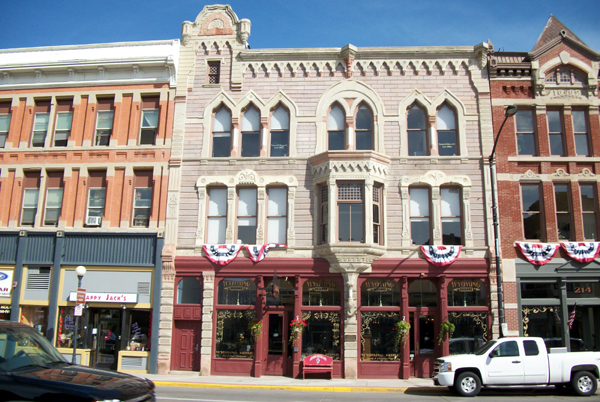
Restored Commercial Block, 2013. Former First National Bank building on
right. Photo by
Geoff Dobson
In the meantime, plans for a new elevated walkway from the Carey Street Garage to a proposed new hotel on the
Wyoming Home site and plans for renovation of the Hynds Building came and went, allegedly held up by litigation over the
Bake Shoppe site. The City sued the owner of the Bake Shoppe to recover the cost of the cleanup. The owner
defended on due process grounds and argued that the ovens and other equipment in the building had
great salvage value and had been improperly disposed of by the City in the land fill. The prosecution and
defense of the suit were accompanied by a war of E-mails and accusations of
slander. In August 2007, a judgment in favor of the City was entered against the owner. That judgment was
appealed to the Wyoming Surpreme Court which affirmed the determinaton of the District Court. See Coonts and Mary's Bank Shoppe
v City of Cheyenne, 193 P. 3rd 352 (Wyo. 2008).
On the south side of the 200 Block of W. 16th Street there are two building which are regarded as historically significant,
the old "Phoenix Block," now the Wrangler Building, and the Atlas Building.
Next page: The Tivoli Building, the Metropolitan Hotel and the Atlas Theatre.
|